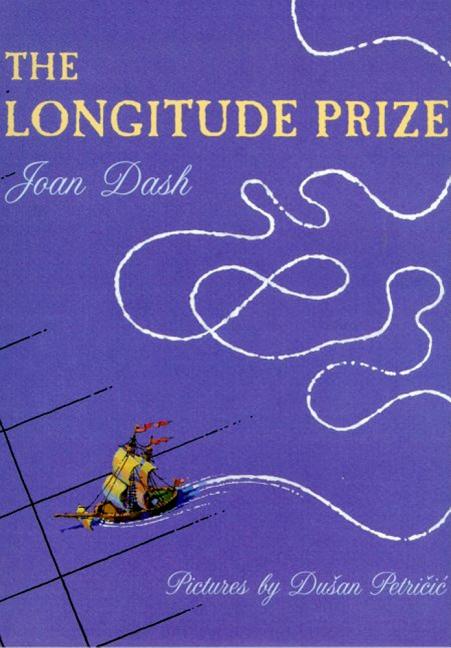Book Descriptions
for The Longitude Prize by Joan Dash and Dušan Petričić
From Cooperative Children's Book Center (CCBC)
Many sailors once perished at sea because they had no way of accurately determining where they were. In 1714, the British Parliament passed the Longitude Act, officially offering an “enormous sum, roughly equal to $12 million today, and lesser awards were offered for partial solutions” to the dilemma. Sir Isaac Newton and Edmond Halley were among the noted scientists who attempted to win the prize, along with many of the “wildest crackpots.” John Harrison, a carpenter who lived in an isolated village almost 200 miles from London, enjoyed making and tinkering with clocks in his spare time. Harrison was highly intelligent but not formally educated. He was a single-minded rural person, not part of the elite class of men running the maritime, governmental, and society life of the 18th century. He was a “loner, plain-spoken, often tactless, with a temper he couldn’t always control, and a genius for mechanics.” These personal circumstances caused Harrison to frequently fail and finally succeed throughout the decades he needed to prove his sea-clocks. He did not win the prize. No one did. Today Harrison’s inventions can be seen in the Royal Observatory in Greenwich, and his works are studied by scholars. A well-documented, stimulating account of Harrison’s tenacity along with a graphic description of what it was like to be at sea during that century. (Ages 11-16)
CCBC Choices 2001. © Cooperative Children's Book Center, Univ. of Wisconsin - Madison, 2001. Used with permission.
From the Publisher
A Robert F. Sibert Honor Book
By the start of the eighteenth century, many thousands of sailors had perished at sea because their captains had no way of knowing longitude, their east-west location. Latitude, the north-south position, was easy enough, but once out of sight of land not even the most experienced navigator had a sure method of fixing longitude. So the British Parliament offered a substantial monetary prize to whoever could invent a device to determine exact longitude at sea. Many of the world's greatest minds tried -- and failed -- to come up with a solution. Instead, it was a country clockmaker named John Harrison who would invent a clock that could survive wild seas and be used to calculate longitude accurately. But in an aristocratic society, the road to acceptance was not a smooth one, and even when Harrison produced not one but five elegant, seaworthy timekeepers, each an improvement on the one that preceded it, claiming the prize was another battle. Set in an exciting historical framework -- telling of shipwrecks and politics -- this is the story of one man's creative vision, his persistence against great odds, and his lifelong fight for recognition of a brilliant invention.
By the start of the eighteenth century, many thousands of sailors had perished at sea because their captains had no way of knowing longitude, their east-west location. Latitude, the north-south position, was easy enough, but once out of sight of land not even the most experienced navigator had a sure method of fixing longitude. So the British Parliament offered a substantial monetary prize to whoever could invent a device to determine exact longitude at sea. Many of the world's greatest minds tried -- and failed -- to come up with a solution. Instead, it was a country clockmaker named John Harrison who would invent a clock that could survive wild seas and be used to calculate longitude accurately. But in an aristocratic society, the road to acceptance was not a smooth one, and even when Harrison produced not one but five elegant, seaworthy timekeepers, each an improvement on the one that preceded it, claiming the prize was another battle. Set in an exciting historical framework -- telling of shipwrecks and politics -- this is the story of one man's creative vision, his persistence against great odds, and his lifelong fight for recognition of a brilliant invention.
Publisher description retrieved from Google Books.


